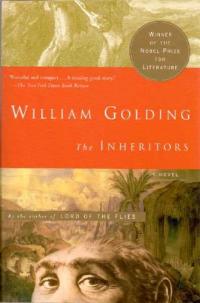The Inheritors by William Golding
 Tuesday, February 22, 2011 at 7:55PM
Tuesday, February 22, 2011 at 7:55PM 
First published in 1955
The Inheritors tells the story of a small group of Neanderthals, primarily focusing on Lok and Fa, as they encounter strange "new people" who walk upright, have little body hair, shoot pointed twigs through the air, and ride across the water on hollow logs. The Neanderthal tribe includes a young girl and a baby ("the new one") who end up with the new people. Lok and Fa must face their fears of the new people as they try to bring the girl and baby home.
The word that kept coming to mind as I read and thought about this book was "clever." Writing about life from the Neanderthal perspective poses a challenge, and Golding used some clever devices to describe the limitations of primitive beings. Golding's Neanderthals communicate by gesture and empathy as much as by language. Their names are simple compared to the polysyllabic names of the humans. The Neanderthals live very much in the here and now; they aren't good at planning; when they talk about doing something new they say they have a "picture" of it, as if they are having a vision. They search for food only when they feel hunger; if they're sated they don't bother to store food for the future. They prefer not to eat meat but they will if one animal has been killed by another; they don't want the "blame" of causing an animal's death. They have a touching burial ritual but they don't appear to contemplate the possibility of an afterlife.
A startling event occurs toward the end of the novel that makes the whole thing rather depressing, particularly for those who (perhaps unrealistically) expect humans to behave more civilly than Neanderthals. Golding may be saying that the simple decency of primitive life was supplanted by early humans who (like those who followed them) lacked respect for other forms of life, killed ruthlessly, and used their wits to advance at the expense of others. If Golding is saying that these are human traits, the product of an evolutionary imperative, I don't know that the point is particularly profound (although it might have seemed so in 1955 when the book was first published). Still, the story illustrates that lesson in an entertaining way. The last chapter shifts to the point of view of the humans: again, a clever way to distinguish between the dying past and the evolving present, and a device that adds insight by demonstrating that the human's view of the Neanderthal may not have been much different than the Neanderthal's view of the human.
According to the cover blurb, some critics think The Inheritors is Golding's best work (and Golding apparently thought so himself). I prefer Lord of the Flies, but The Inheritors is certainly worth reading.
RECOMMENDED
Reader Comments